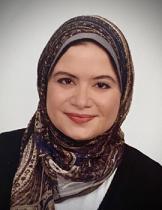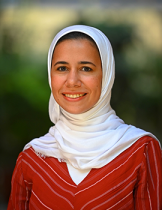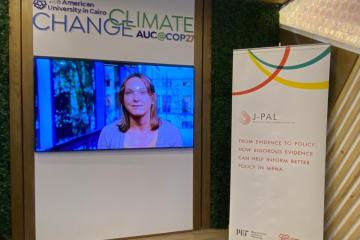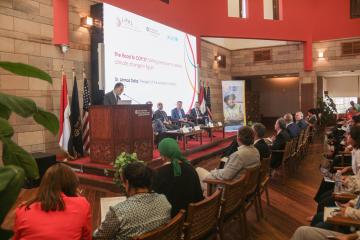
Partnering for resilience: Strengthening climate adaptation in the Middle East and North Africa
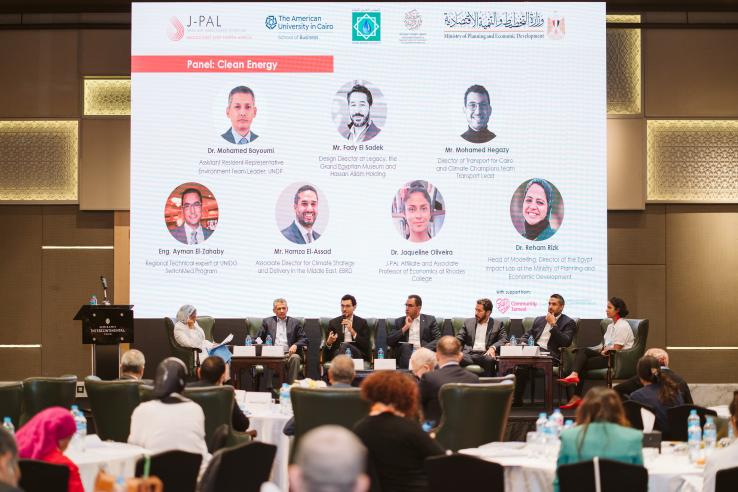
In 2022, the United Nations drew attention to the disproportionate allocation of climate finance funds, with a staggering 90 percent directed towards climate mitigation and only 10 percent towards climate adaptation. This imbalance resulted in a growing call to address this issue. Dr. Mahmoud Mohieldin, UN climate change high-level champion for Egypt, underscored the importance of prioritizing funding adaptation measures alongside curbing activities that contribute to rising greenhouse gasses. In response to these calls for action, the 28th Conference of Parties (COP28), happening in the United Arab Emirates soon, will recognize adaptation as a key theme thus highlighting the urgent need to address climate change's immediate effects on local communities and equip them with necessary tools to adapt.
The urgency of this matter is compounded by the fact that climate change will have a disproportionate impact on low- and middle-income communities and countries, which have limited resources to adapt. Meanwhile, high-income countries bear a significant responsibility for greenhouse gas emissions.
Evidence generation for climate action
The Middle East and North Africa (MENA) region is particularly vulnerable to the challenges posed by climate change, dealing with high water scarcity, air pollution, and extreme heat. These trends have had a direct impact on agriculture, leading the region to experience the largest food deficit across the globe. In response to these challenges, Arab states, such as Egypt, Morocco, Saudi Arabia, and the UAE, have made efforts to commit to adaptation goals. Their Nationally Determined Contributions (NDCs), reflect these efforts, allocating money to clean energy infrastructure, national water management plans, and sustainable agriculture transformation initiatives.
Scientific research and evidence generation are required to understand which interventions are effective in contributing to reaching the NDCs. Unfortunately, the MENA region has one of the lowest budget allocations to environmental research worldwide, estimated at 1.7 percent. This lack of funding hinders the development of effective climate policies and strategies.
To create adaptation strategies tailored for the MENA region, it is necessary to conduct further research to generate rigorous evidence on the effectiveness of climate adaptation and mitigation strategies. Randomized impact evaluations play a key role here. By utilizing randomized evaluations, policymakers and stakeholders can make data-driven decisions and allocate resources to interventions with the greatest impact on society and the environment. This approach ensures that limited funds are used effectively and efficiently, thus maximizing the benefits of adaptation policies.
Partnership Development for Climate Adaptation in Arab States
In the context of leveraging randomized evaluations for climate action, developing partnerships between various stakeholders is a necessary first step. From that premise, J-PAL MENA at the American University in Cairo co-hosted with the Ministry of Planning and Economic Development in Egypt, the National Institute of Governance and Sustainable Development, and the Arab Water Council the “Partnership Development for Climate Adaptation in Arab States” (PDCA) conference, that was held on September 26 and 27, 2023 in Cairo.
PDCA began with keynote addresses provided by H.E. Dr. Hani Sewillam, the Egyptian minister of irrigation and water resources, and H.E. Dr. Hala ElSaid, minister of planning and economic development in Egypt. Both speakers emphasized the government’s commitment to tackling environmental issues by relying on accurate scientific evidence that enhances national development efforts.
Subsequently, four key thematic areas were discussed at PDCA in relation to climate adaptation. These areas were derived from the Glasgow-Sharm El-Sheikh work program and included:
- Water quality and management,
- Education and green skills,
- Clean energy, and
- Agriculture and food security.
Panel sessions involved knowledge-sharing presentations by J-PAL affiliated researchers Kyle Emerick, Raymond Guiteras, Menno Pradhan, and Jaqueline Oliveira. In addition, thematic roundtable discussions were conducted to initiate partnerships and align climate action towards innovative policies and programs in the region.
Throughout the PDCA conference, there was a call to action for partnerships between environmental stakeholders to encourage evidence-based policymaking in shaping the Arab region’s climate agenda. Margaret Sancho, deputy mission director at USAID Egypt, emphasized during her panel discussion that all climate actors should be involved in tackling climate change and generating innovative solutions, whether they be in the private sector, public sector, civil society, or academia. Along these lines, PDCA brought together climate negotiators from Egypt, Palestine, Iraq, Lebanon, Somalia, and Sudan to exchange views on how to establish a unified regional climate adaptation strategy and mobilize efforts to serve the Global Goal on Adaptation.
Looking ahead: The Air and Water Lab in Egypt
The PDCA conference showcased the potential of randomized evaluations and J-PAL's global research in informing evidence-based solutions for climate action. The conference also marked the soft launch of the Air and Water Lab (AWL) in Egypt, which responds to air and water challenges through the co-generation of evidence between researchers and government partners.
As George Richards, Director of Community Jameel, emphasized in his opening remarks at PDCA: “Air pollution does have a cure, it lies in science and evidence…We need to think of segments in society that are most affected by air pollution. For the sake of our children, let us come together to write the next chapter."
Looking ahead, the discussions held at the conference shed light on research opportunities that are to be further explored under the AWL in Egypt and the possibilities to use evidence in climate negotiations such as the upcoming COP28 in Dubai. By continuing to bridge research and policy work and anchoring activities within local contexts, responsive climate action will accelerate in MENA.

